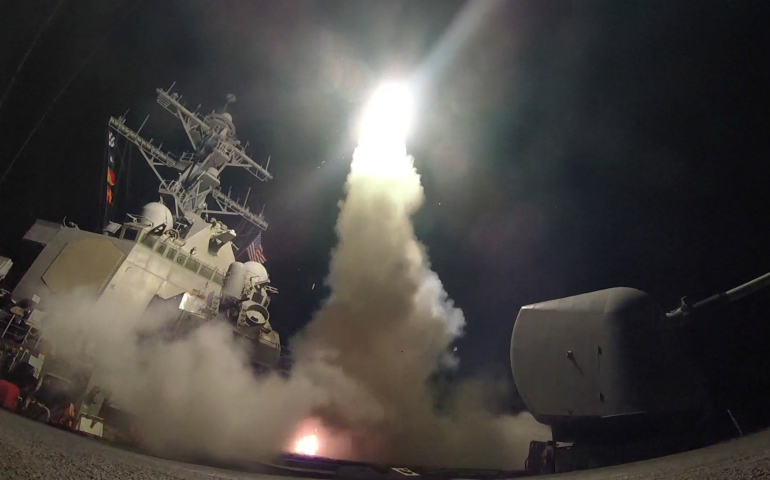
The USS Porter, in the Mediterranean Sea, fires a Tomahawk missile April 7. The missile strike on a Syrian air base days after chemical weapons were dropped on civilians in rebel-controlled territory further endangers innocent people, said observers familiar with the just-war theory. (CNS photo/U.S. Navy handout via Reuters)
I took a phone call from a reader a couple days ago. He described himself as "a longtime subscriber." The local diocesan paper is little more than a public relations tool for the bishop, and other media that cover religion have an agenda to support, he said. NCR, when it covers the Catholic Church, is authoritative and reliable, he said, which is why he keeps subscribing.
That was the preface, not the point of his call, however. He was calling to complain. He hated the editorial in our last issue (April 21-May 4), which called on Congress to rescind the 2001 Authorization for Use of Military Force Against Terrorists resolution and require the Trump administration to come back to Congress to seek a new authorization for military actions. We noted that three administrations have used the 2001 resolution, passed in the immediate trauma of the Sept. 11, 2001, attacks on Washington and New York, as the legal basis for military actions stretching the world: the Philippines, Afghanistan, Yemen, Somalia, and, most visibly now, in Syria. We argued that the specifics of that authorization no longer hold.
For the record, NCR editorials in 2003 opposed President George W. Bush's use of this act as the legal justification to invade Iraq, and NCR called on Congress to stop President Barack Obama from invoking this authorization in 2014 and 2015. We've been nonpartisan in our calls against military force. Now it's time for us to urge action under President Donald Trump.
The reader who called said that our editorial was emblematic of many editorials we write that go beyond Catholic Church issues: We show ourselves as naïve and even Pollyannaish. "You all do fine when you stick to things you know about, but when it comes to national defense and foreign affairs, you're out of your depth," the caller said. "What you propose would be fine if we lived in a perfect world, but we don't."
I really didn't mind his criticism; I've found that civil disagreement helps one sharpen one's arguments, and I do feel obliged to engage subscribers at this level. So, I talked to him a little while. I pointed out that it is a constitutional duty of Congress to allow or restrain presidents' military endeavors. It is a key — and too often abused — part of our democratic system, I said.
"We're not asking for unilateral disarmament," which the caller suggested we were calling for. "We just want a full, robust debate about our nation's military policy, especially in the Middle East," I said. "And the Constitution says that debate should happen in Congress for all the public to hear."
"Oh, no," the caller interjected. "We don't want that bunch talking about this in public." We can't have discussion of military policy in public or in Congress, the caller asserted, because we can't trust politicians to be knowledgeable or trustworthy enough for an honest discussion. "You've got to leave that to the president and the generals."
This is where I grew uncomfortable with the discussion. "But the Constitution says it is the duty of Congress as representatives of the people …" I began, but he stopped me.
"They can't handle it," he said. "You've got to leave it to the president and generals."
The conversation pretty much ended there. (He did promise to keep subscribing because he does want to read our church news, but the rest, he said, he'll skip.)
I was a bit unnerved by this phone call, not so much because the caller seemed willing to grant the military free rein and no civilian oversight, but because he seemed to abandon a basic tenet of American democracy, namely, that elected officials can represent and serve the citizens of this nation. He was making the case of governance by strongmen.
He probably would disagree with that characterization, but it seems to be a logical conclusion to what he was saying. He was willing to concede control of the full force of U.S. military might to a president and a handful of generals. Would that end with questions of military force and foreign policy? I doubt it.
I can cite numerous cases from contemporary times and history to show where this idea of strongman rule takes a country. Very few people would have argued at the time of Zimbabwe's independence in 1980 that Robert Mugabe was not the man to head the government. He clearly had the best interests of the fledging nation in mind. Some 37 years later, can anyone still make that case? That's where strongman rule takes a nation.
The last few years have seen for many reasons a steady deterioration of public faith in public institutions. I find that increasingly worrisome. Because of partisanship and ideology, Congress has become frustratingly dysfunctional, but I am not ready to dismiss the institution entirely.
I hope that in this regard, I am not naïve and Pollyannaish. To paraphrase Winston Churchill: Democracy may not be the ideal form of governance, but it seems to have beaten all the others tried so far.
[Dennis Coday is NCR editor. His email is dcoday@ncronline.org. Follow him on Twitter @dcoday.]



